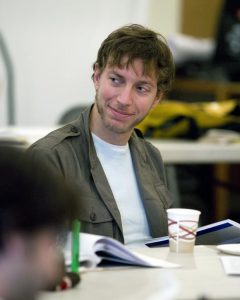 Thirty years ago, hearing news that a theater professional had succumbed to complications from HIV/AIDS was sad but not unexpected — the disease devastated much of the New York theater community. But with the advent of protease inhibitors and the AIDS “cocktail,” celebrity HIV deaths, especially among young people, moved from a deluge to a trickle.
Thirty years ago, hearing news that a theater professional had succumbed to complications from HIV/AIDS was sad but not unexpected — the disease devastated much of the New York theater community. But with the advent of protease inhibitors and the AIDS “cocktail,” celebrity HIV deaths, especially among young people, moved from a deluge to a trickle.
And do it was especially shocking to learn this weekend that gay composer Michael Friedman — who composed the hit musical Bloody Bloody Andrew Jackson, as well as the Dallas Theater Center’s world premiere musical Fortress of Solitude in 2014 — died Saturday at his home in New York from complications from AIDS. He would have turned 42 later this month.
 It is perhaps the overall circumstances of his passing — his age, the cause of death, his abiding talent — that makes the loss sting most. Many of us had forgotten the scourge that HIV wrought on the arts community; this was a sobering reminder of its ever-presence.
It is perhaps the overall circumstances of his passing — his age, the cause of death, his abiding talent — that makes the loss sting most. Many of us had forgotten the scourge that HIV wrought on the arts community; this was a sobering reminder of its ever-presence.
I interviewed Friedman the year after Fortress debuted at the Wyly when the score had been released as an original cast recording, and it just reminded me again how special the show was.
In a tweet about Friedman’s death, Hamilton creator Lin-Manuel Miranda lamented, “Mourning all the music we’ll never hear.” That’s what a score like Fortress or Andrew Jackson leaves you with.
“I am deeply saddened at the passing of Michael Friedman,” Kevin Moriarty, who commissioned Fortress fort DTC, said in a statement. “Michael was touched with a genius that not only included an encyclopedic understanding of nearly all forms of music, but also with a deep insight into people, and a ferocious desire to transmit that insight into art. He talked and thought faster than almost anyone I’ve ever met, and he had passionate opinions about everything. I always imagined that DTC would be the home to his next great musical, though now we will never know what songs and ideas he would have created. His passing breaks my heart, but I’m so very proud that his most accomplished score was premiered on our stage.”
– Arnold Wayne Jones

















